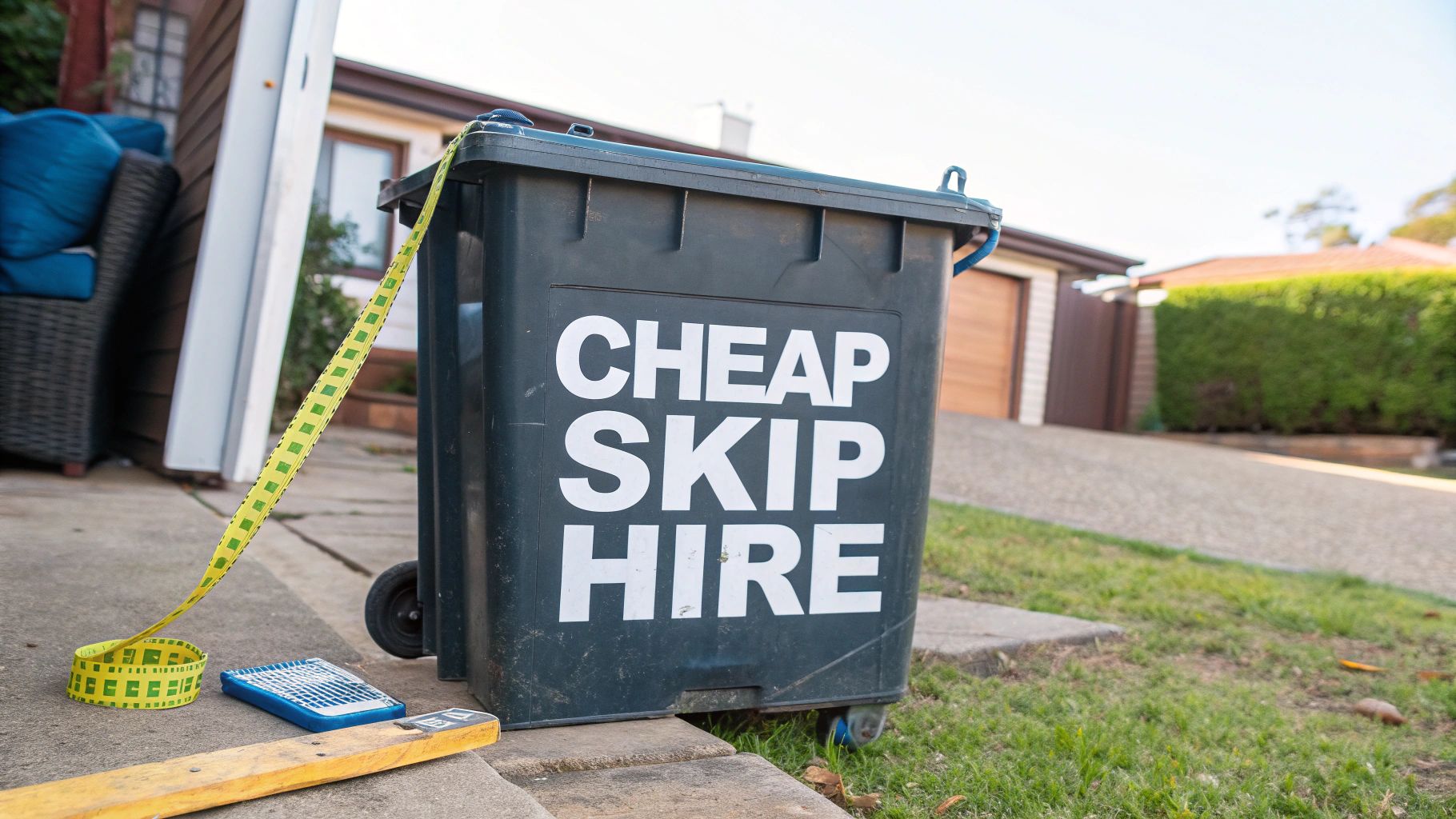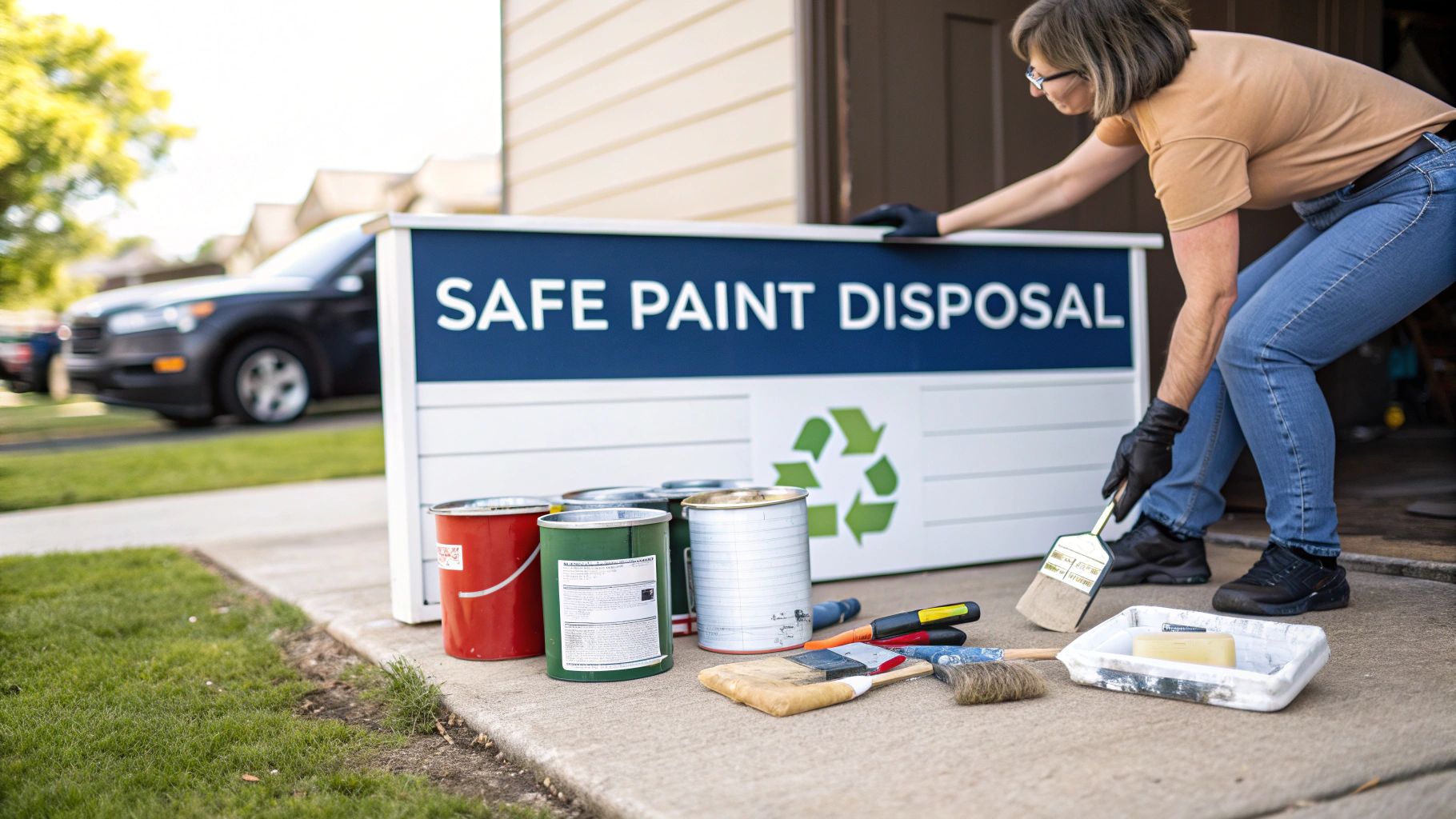Skip Hire Christchurch A Complete Guide
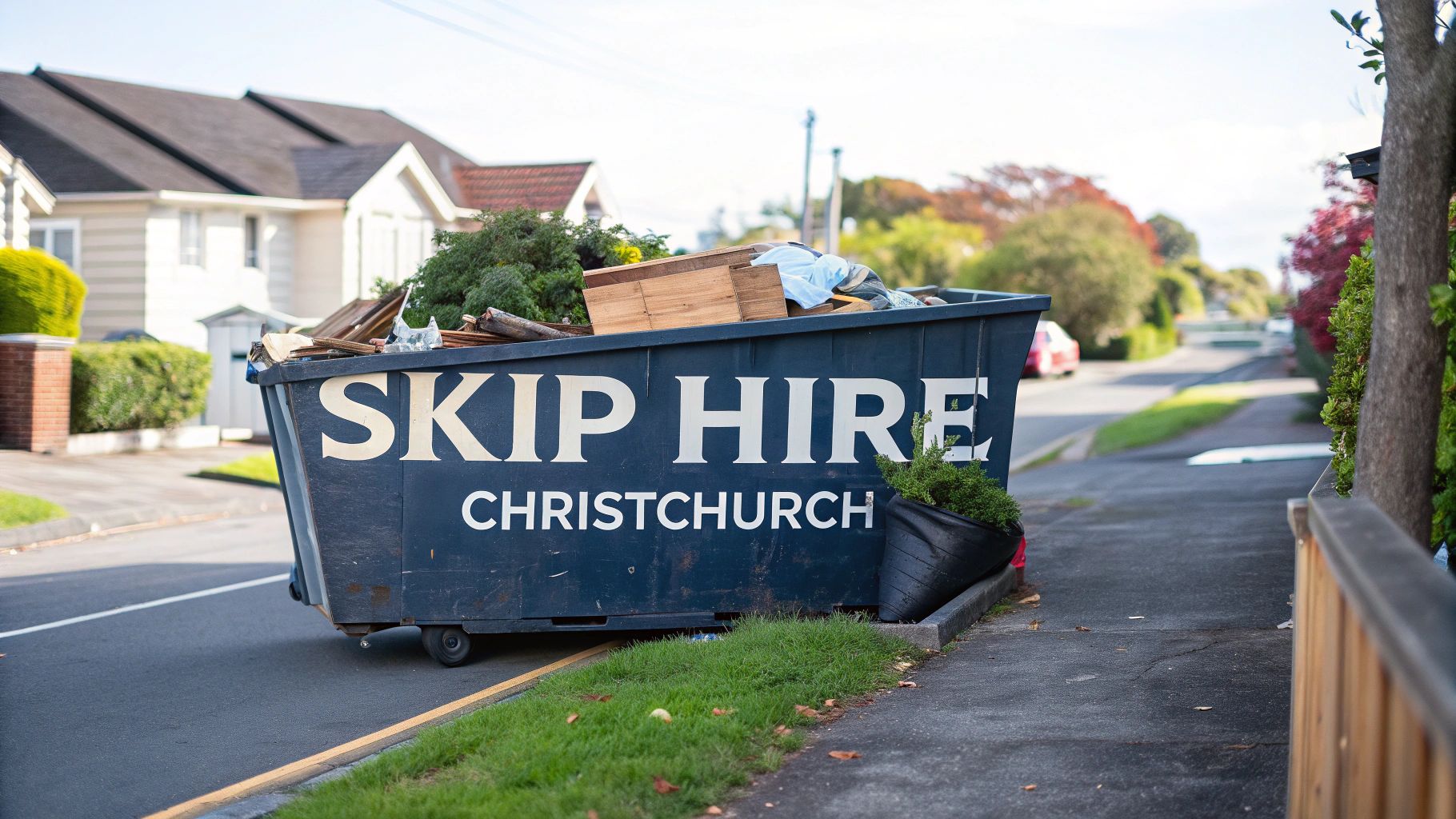
Skip Hire Christchurch A Complete Guide
Whether you're planning a garden clear-out or a major home renovation in Christchurch, you'll eventually face the same question: what do I do with all the rubbish? For most jobs, skip hire is the simplest, most cost-effective answer. It’s a straightforward way to deal with a mountain of waste, and this guide will walk you through the whole process, step by step.
Making Sense of Skip Hire in Christchurch
Let’s be honest, when you’re staring at a growing pile of debris, the last thing you want is a load of confusing industry jargon. Skip hire can seem a bit complicated from the outside, but it’s really quite simple once you know the basics. Getting a handle on these fundamentals early on means you’ll make the right choices for your project.
This guide is here to cut through the noise. We'll break down everything you need to know and show you why picking the right service is so important for keeping your project on track and on budget.
Why Skip Hire is the Smart Choice
For most projects, hiring a skip is far easier than doing countless runs to the local tip. Just think of the time, fuel, and sheer effort you'll save. A single skip takes it all in one go, leaving you free to focus on the actual work at hand. Having the right information is crucial for any home improvement project, whether it's waste management or tackling other tasks. You can find essential UK DIY guides for home security upgrades and other useful tips from trusted sources.
So, what are the real benefits of hiring a skip?
- Convenience: The skip arrives at your door and is collected when you’re done. Simple.
- Efficiency: You save yourself hours of loading, driving, and queuing at the recycling centre.
- Cost-Effectiveness: When you add up fuel costs and the potential wear and tear on your car, a skip often works out cheaper.
- Environmental Responsibility: A good skip company makes sure your waste is properly sorted, with as much as possible being recycled.
One of the biggest myths is that skips are only for huge construction jobs. The truth is, with so many sizes available, they’re perfect for everything from small garden tidy-ups and house clearances to DIY renovations.
At the end of the day, using a professional skip hire christchurch service just makes your project run more smoothly. To get a feel for what’s out there, have a look at some local skip hire services in Christchurch and find the right fit for your job. This groundwork will make the whole process a breeze.
Choosing the Right Skip Size for Your Project
Picking the right skip size is probably the single most important decision you’ll make when hiring one. Get it right, and your project will run like clockwork. Get it wrong, and you could be stuck paying for a second skip or, just as frustratingly, for empty space you didn't even need. It’s a common pitfall, but a bit of forethought makes all the difference.
First things first, what's the scale of your job? Are you just having a weekend clear-out of the garden shed, or are you gutting an entire kitchen? The volume of waste is what will guide your choice. Trying to stuff rubble from a renovation into a mini skip is a non-starter, and ordering a giant skip for a bit of garden waste is just throwing money away.
Common Skip Sizes and What They’re Good For
It can be tough to picture what "cubic yards" actually means in the real world. Let's break down the most popular options for skip hire in Christchurch to give you a clearer idea.
-
2-4 Yard Skips (Mini/Midi): These are your best bet for small domestic jobs. A 2-yard skip holds roughly 20-30 bin bags, making it perfect for a garden tidy-up. The slightly larger 4-yarder can take 40-50 bags, which is usually enough for a small bathroom or kitchen refit. They’re also nice and compact, so they’ll fit on most driveways.
-
6-8 Yard Skips (Builder's Skips): This is the sweet spot and by far the most popular range. A 6-yard skip is brilliant for a medium-sized renovation, while the 8-yard skip is the largest you can get for heavy waste like soil, rubble, and concrete. It’s the go-to for most builders and serious DIY projects.
To make things even easier, here's a quick reference table.
Christchurch Skip Size Guide
| Skip Size (Cubic Yards) | Approx. Bin Bags | Ideal For |
|---|---|---|
| 2 Yard | 20-30 | Small garden clear-outs, minor decluttering |
| 4 Yard | 40-50 | Small kitchen or bathroom refits, shed clearances |
| 6 Yard | 60-70 | Medium renovations, bulky waste, office clear-outs |
| 8 Yard | 80-90 | Large domestic projects, construction site waste |
Choosing the right size really comes down to matching the skip's capacity to your project's waste. This table should give you a solid starting point for making that call.
My best advice? If you're torn between two sizes, always go for the bigger one. The price difference is usually small, and it’s a lot cheaper than having to hire a second skip later on.
If you want to dig deeper, our full guide on what size skip you need has more tips to help you get it right the first time.
A Quick Way to Estimate Your Waste
Before you even pick up the phone, try to gather all your waste in one pile. It sounds simple, but getting a visual on the volume you're dealing with is the most reliable way to make an accurate estimate. Don’t forget that awkward, bulky items like old furniture will take up more room than things you can break down flat.
And while you’re planning, think about everything you’ll need on-site. It’s not just about waste; for larger jobs, you might also need things like construction site portable toilet hire to keep things running smoothly.
Thinking of doing it yourself? This might change your mind.
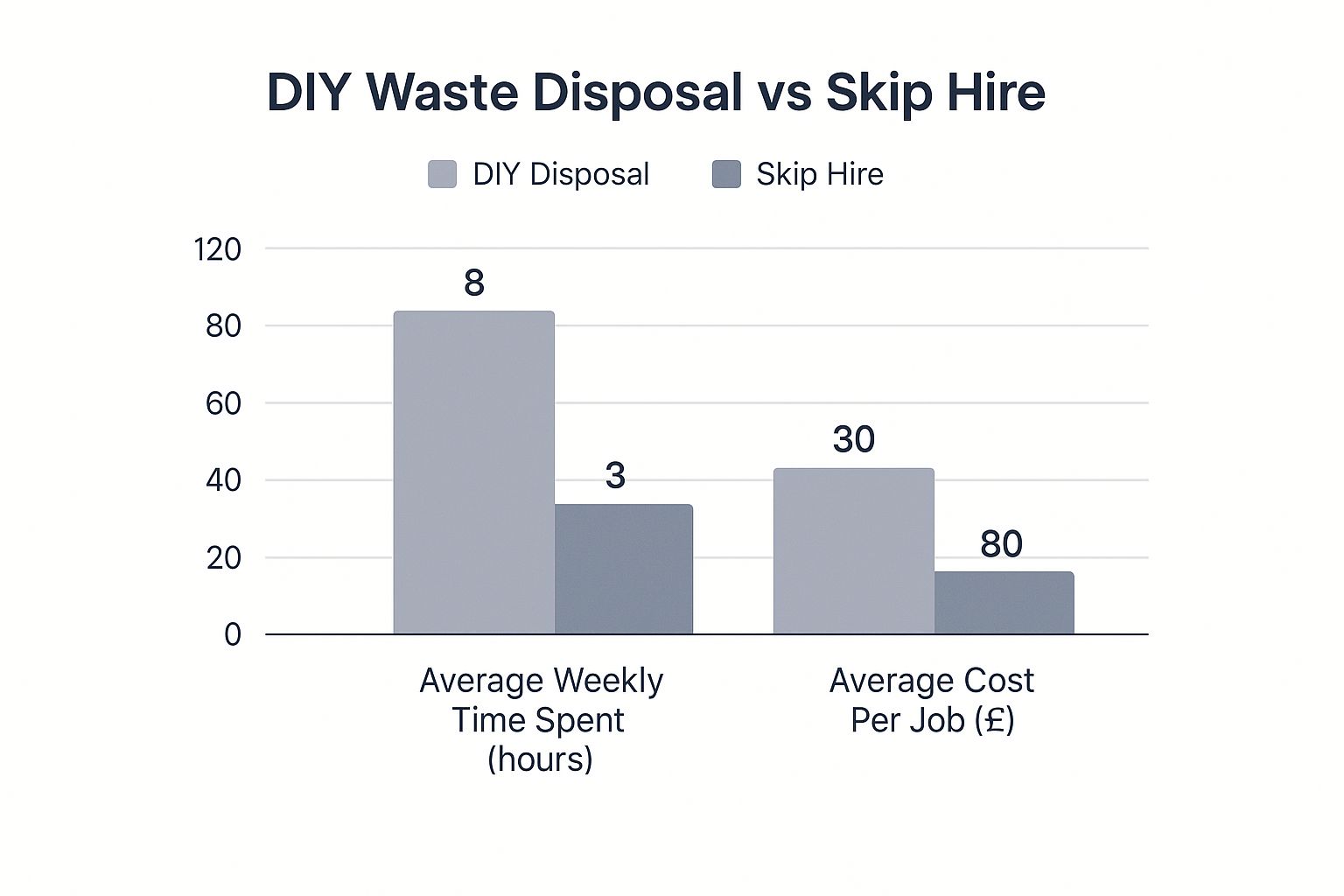
As you can see, hiring a skip doesn’t just save you a huge amount of time and effort—it can often work out cheaper than doing multiple tip runs yourself. The efficiency is a big reason why skips are such a fixture in the UK.
The numbers don't lie. The UK generates about 200 million tonnes of waste every year, with around 17 million skips hired annually. That demand soared back in 2020 when Brits invested a record-breaking £50 billion in home renovations. It just goes to show how essential skip hire has become for projects big and small across the country.
Navigating Skip Permits and Local Council Rules
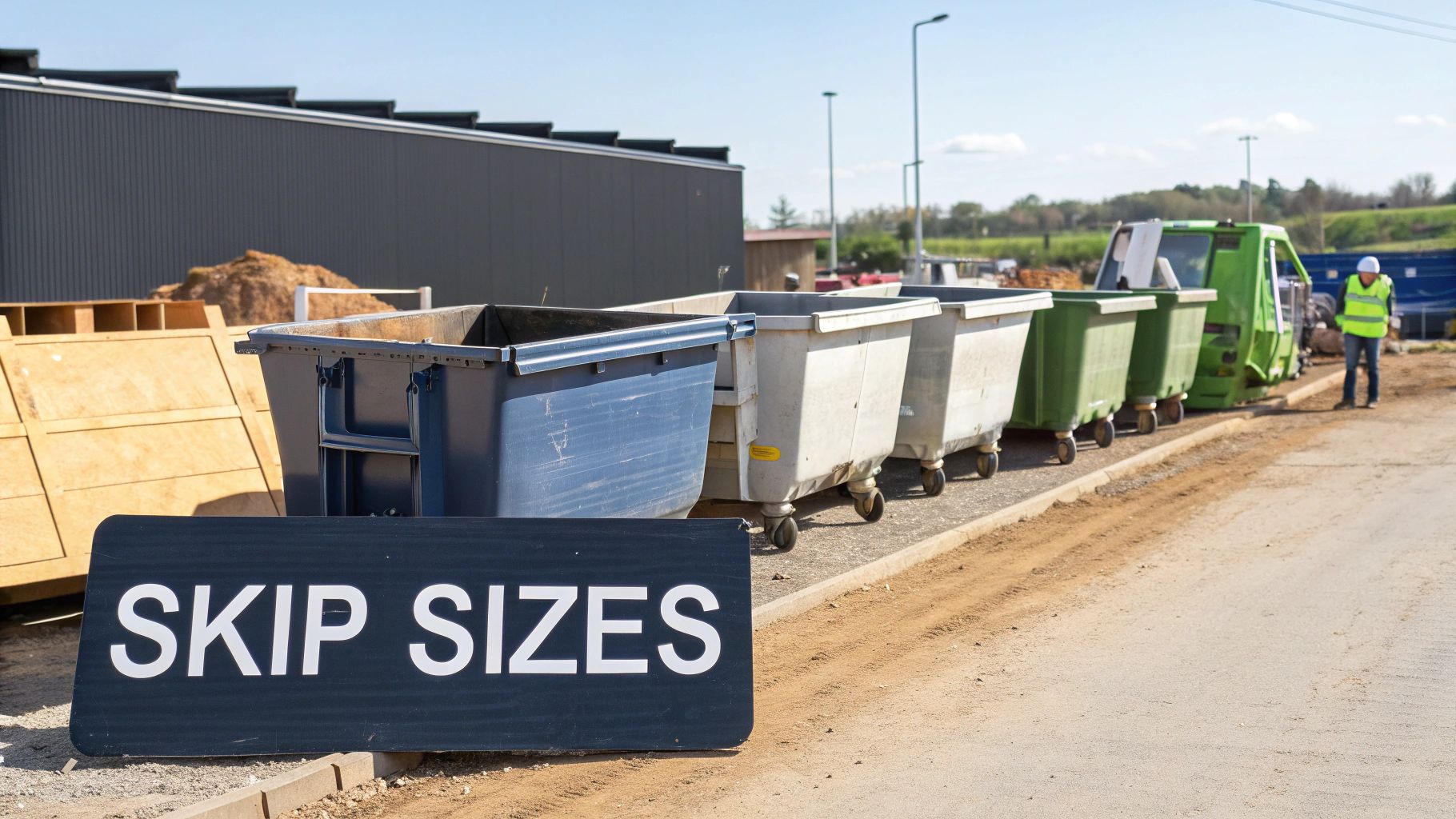
One of the first questions we always ask is, "Where's the skip going to go?" It’s a detail that’s easy to overlook. If you’ve got a roomy private driveway, fantastic – you’re sorted. But if the skip needs to sit on public land, like the road, a pavement, or even a grass verge, then you’re stepping into the world of council regulations.
Trust me, trying to sneak a skip onto the road without permission is a costly gamble. Councils can issue hefty fines and might even remove the skip without warning. It's a critical detail to get right for any skip hire Christchurch project where you can’t keep it on your own property.
Understanding the Permit Process
Here’s the good news: you won’t be drowning in paperwork. A reputable skip hire company will handle the entire permit application for you. We have the right contacts and know the process inside out, which makes everything run much more smoothly.
When you book, just let us know it's going on public land. We’ll take a few details and get the ball rolling with the local council.
Key Takeaway: The skip hire company is responsible for getting the permit sorted. Your main job is to give them the right information and, crucially, enough time for the application to go through before you need the skip.
What to Expect When Applying
Even though your provider is doing the heavy lifting, it helps to know what’s involved so you can plan your timeline. Rushing things is where problems start.
Here’s a quick rundown of how it usually works:
- Lead Time: Don’t expect a permit instantly. You need to allow at least 3-5 working days for the council to process everything. So, planning for next-day delivery on a public road just isn't feasible.
- Required Information: We'll need the exact address where the skip will be placed, your contact details, and how long you plan to have it.
- Associated Costs: The permit fee is an extra charge, separate from the skip hire itself. This cost is set by the local council, and we simply pass it on to you.
Staying Compliant with Local Rules
Once the permit is in place, there are strict safety conditions that have to be met. These aren't just suggestions; they’re non-negotiable rules designed to keep everyone safe.
In Christchurch, this is all about making the skip highly visible, especially at night. Your skip hire company is responsible for making sure it’s kitted out correctly. This typically includes:
- Safety Lights: Amber lights must be fixed to both ends of the skip so drivers can see it clearly in the dark.
- Reflective Markings: The skip has to have reflective strips along its sides and ends.
- Traffic Cones: You'll often see cones placed around the skip to help guide traffic and pedestrians safely around the obstruction.
Getting this wrong can invalidate the permit and lead to fines. It's vital that your skip is correctly set up from the moment it lands.
What You Can and Cannot Put in Your Skip
Knowing what to toss in and what to leave out of your skip is far more than a simple formality. Get it right, and your project will run like clockwork. Get it wrong, and you could be facing unexpected charges or even having your waste refused.
For the most part, general waste from a home or commercial clear-out is absolutely fine. Think of it in three main buckets: general household junk, garden cuttings, and construction debris. Your standard skip hire Christchurch service is geared up to handle this mix of non-hazardous stuff.
So, What's Allowed?
Most of the junk you’ll generate during a renovation, garden blitz, or big clear-out is perfectly acceptable. To make it crystal clear, here’s a quick rundown of what you can load up without a second thought.
- General Household Rubbish: We’re talking about old furniture, worn-out carpets, plastics, and any non-electrical fittings.
- Wood and Metal: All types of untreated wood, scrap metal from old projects, and timber offcuts are good to go.
- Soil and Rubble: Heavy stuff like soil, bricks, concrete, and stones are accepted. Just remember these are usually restricted to 8-yard skips or smaller because of their sheer weight.
- Green Waste: Garden trimmings like branches, leaves, grass, and old turf can all be included.
This flexibility is exactly why skips are such a go-to solution for everything from a weekend garden makeover to a full-blown property renovation. But knowing what’s banned is just as crucial.
Items That Are Strictly Off-Limits
Certain items are a hard no for skips, and for very good reason. They’re banned for critical safety and environmental purposes and need specialist disposal to prevent harm to people and the planet. Trying to sneak them in under other rubbish can lead to the entire load being rejected or you being hit with significant extra fees.
The rules around waste aren't just there to be difficult; they’re driven by important regulations like the Environmental Protection Act. This legislation demands better waste segregation and higher recycling rates, which is why correct disposal has become so vital. It’s a major factor in ensuring waste is handled responsibly.
The list of forbidden items is quite specific because these materials simply can't be processed at a standard recycling facility.
- Asbestos: This is a highly hazardous material that must only be handled by licensed specialists. Never, ever put it in a skip.
- Plasterboard: When mixed with other waste, it can release harmful gases. It always needs to be disposed of separately.
- Electricals (WEEE): Anything with a plug or a battery—think fridges, TVs, kettles, and microwaves—has to go to a dedicated WEEE recycling facility.
- Tyres and Batteries: These contain nasty chemicals that are incredibly damaging to the environment if they leach out.
- Liquids: Paint, solvents, oil, and other liquids are banned because they can leak and contaminate huge amounts of otherwise recyclable materials.
- Gas Cylinders: These pose a serious explosion risk at waste facilities and must be returned to the supplier.
For a more comprehensive look at restricted items, this guide on what you cannot put in a skip is a great resource. If you have any of these items, your local Christchurch recycling centre or a specialised collection service is the right port of call. It’s always best to check with them first to make sure you’re following the correct procedure.
Your Skip Hire Journey from Booking to Collection
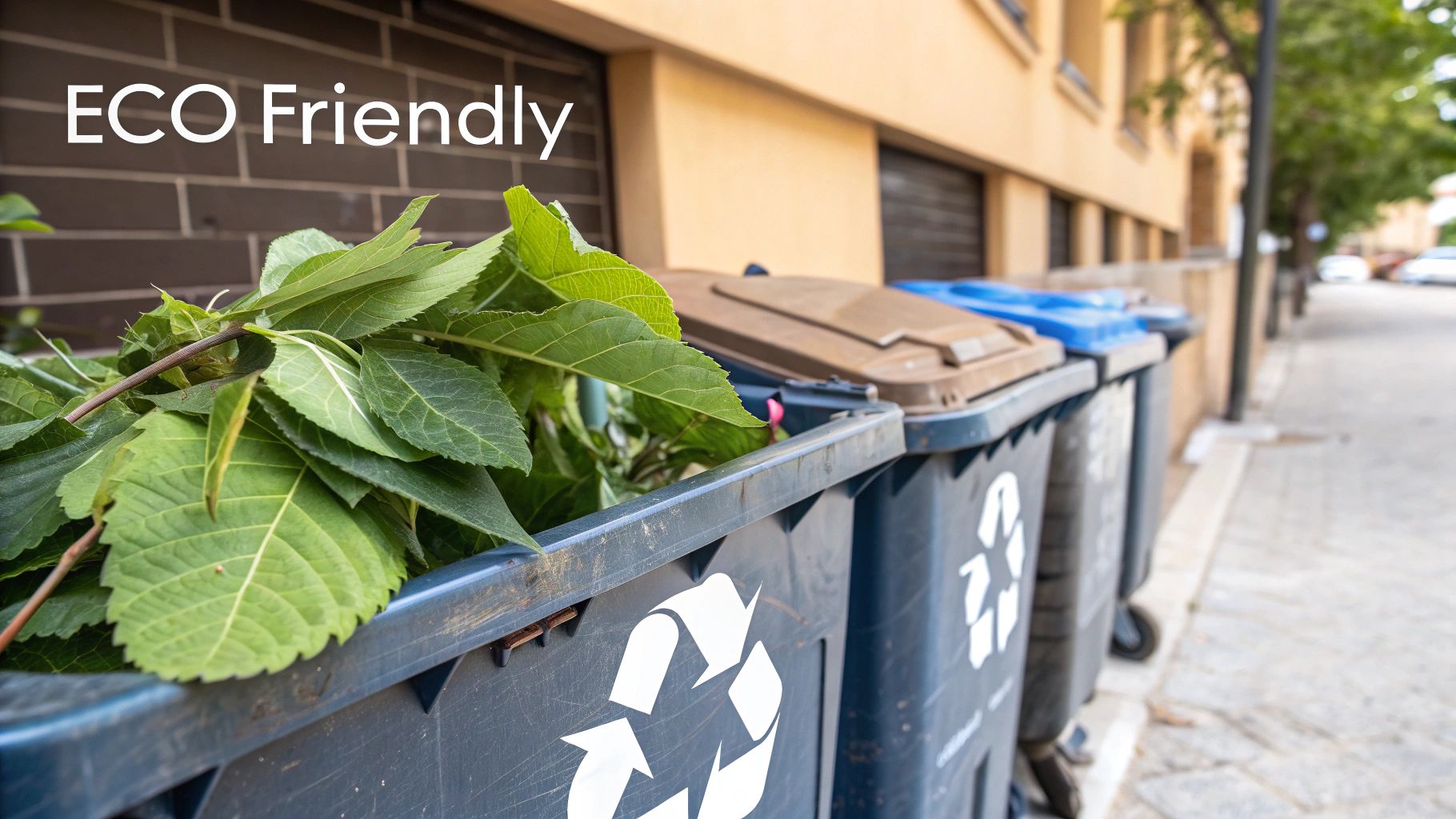
So, you've decided on a skip. Great choice. Let's walk through the whole process, from the initial phone call right through to the final collection. We'll cut through the jargon and make sure your hire is completely stress-free.
Booking is far simpler than most people think. When you get in touch for a quote, just have a few key details ready. We'll need your postcode, a rough idea of the waste you’re getting rid of (is it general rubbish, garden waste, or heavy rubble?), and, most importantly, where the skip is going to sit.
Preparing for a Smooth Delivery
Once you've booked, the next thing to think about is delivery day. A little bit of prep goes a long way to making the drop-off a breeze.
The main job is to make sure the delivery area is totally clear and accessible for our lorry. This means shifting any cars, moving obstructions, and double-checking there’s enough room for the driver to manoeuvre safely.
When the skip arrives, it pays to give it a quick once-over:
- Is it the size you ordered?
- Has it been placed exactly where you need it?
- If it’s on a public road, are the required safety lights present?
Expert Tip: Don't just think about getting the skip dropped off; think about how you're going to fill it. Placing it where you have easy wheelbarrow access will save you a world of effort and a lot of back-and-forth later on.
The UK's skip hire industry is a surprisingly complex and competitive field. A detailed 2023 market study actually highlighted its financial growth and the dynamic nature of its leading companies. It's an interesting look into the business of waste management. You can get more insights by reading the full market analysis of UK skip hire companies.
Loading and Collection Best Practices
Now for the fun part: filling your skip. The golden rule here is to load it smartly to get the most out of the space.
Start with flat items at the bottom—think old doors or flattened cardboard boxes. Next, add your heavier, bulkier materials. Then, just fill in all the remaining gaps with the smaller, looser bits and pieces.
This simple technique helps you fit more in without overfilling it. Always remember that a 'level load' is a legal requirement. Waste can't poke out over the top edges of the skip, as this is a serious safety hazard during transport. If it's overfilled, the driver may have to refuse the collection.
When you're all done, scheduling the collection couldn't be easier. Just give your provider a call to arrange a pickup. Make sure the area around the skip is clear again for the lorry, and a quick sweep after it's gone will leave your property looking tidy. Project complete.
Common Skip Hire Questions Answered

Even after you've got your project all mapped out, a few questions about hiring a skip nearly always pop up. Getting these final details ironed out is what separates a smooth, stress-free clear-out from a frustrating one.
Here, we'll run through some of the most common queries we hear about skip hire in Christchurch. Think of it as your final checklist to make sure you're all set and ready to go.
How Much Does Skip Hire Cost in Christchurch?
The price of hiring a skip isn't a simple, flat fee. A few different things influence the final cost, but it nearly always comes down to two main factors: the size of the skip you need and how long you'll have it on site.
As a rough guide, a small 2-yard 'mini' skip, which is brilliant for a spot of gardening or a small room clear-out, could start from around £120. For something much bigger, like an 8-yard builder's skip needed for a major renovation, you're more likely looking at £250 or more.
The type of waste you're getting rid of can also affect the price. Heavier materials like soil, bricks, and concrete cost more for us to process and recycle, so that gets factored in.
To make sure there are no hidden costs, always get a fully itemised quote that breaks everything down. It should clearly show:
- The base cost of the skip hire
- Any delivery and collection fees
- VAT
- The council permit fee (if your skip is going on a public road)
How Long Can I Keep the Skip?
The standard hire period is typically between one and two weeks. For most home or garden projects, this is more than enough time to get everything loaded up without having to rush.
Of course, we know that jobs don't always go to plan. If you think you'll need the skip for a bit longer, it’s always best to arrange this when you first book. It might add a little to the total cost, but it saves you from scrambling at the last minute.
On the flip side, if you're super-efficient and finish early, just give your skip provider a call. They can often arrange for a quicker collection.
What If I Only Need It for a Few Hours?
If you've got all your waste piled up and ready to go, a 'wait and load' service is a fantastic solution. The driver drops the skip off and waits for around 30 minutes while you load it up, then takes it away there and then. It’s perfect if you don't have space to keep a skip or just want the job done instantly.
What Does a Level Load Mean?
You’ll see the term 'level load' everywhere, and it's one rule you really can't ignore. It simply means all your waste must sit inside the skip, with nothing piled up higher than the sides.
It’s not just a picky rule; it's all about safety.
Overfilled skips are genuinely dangerous. Bits of rubbish can fall out while the lorry is on the road, creating a hazard for other drivers, cyclists, and pedestrians. Because of this risk, it’s illegal for a driver to transport an overloaded skip.
If the collection team arrives to find your skip is overfilled, they will likely have to refuse to take it. You'll then be asked to remove the excess waste before they can try again, which can cause delays and throw your whole schedule out. Sticking to a level load is the easiest way to guarantee your collection day goes off without a hitch.
Ready to get your project started with a reliable, affordable waste management solution? The Waste Group offers a seamless skip hire service across Christchurch and Dorset. Get your free, no-obligation quote online today. Find out more at https://www.thewastegroup.co.uk.

